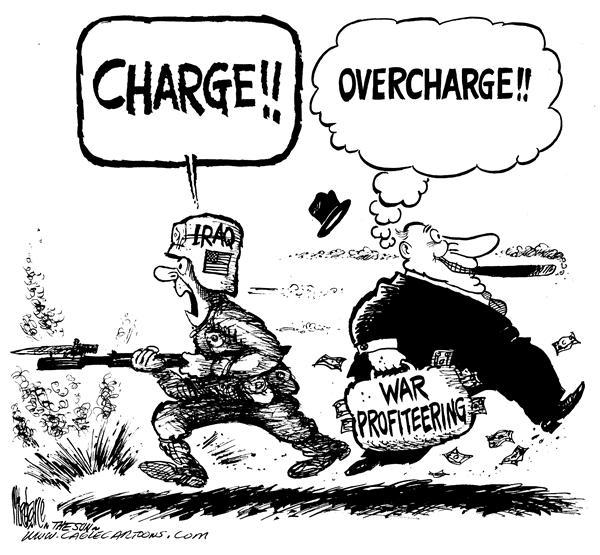Search
Recent comments
- sicko....
7 hours 7 min ago - brink...
7 hours 23 min ago - gigafactory.....
9 hours 10 min ago - military heat....
9 hours 53 min ago - arseholic....
14 hours 36 min ago - cruelty....
15 hours 53 min ago - japan's gas....
16 hours 33 min ago - peacemonger....
17 hours 30 min ago - see also:
1 day 2 hours ago - calculus....
1 day 2 hours ago
Democracy Links
Member's Off-site Blogs
warhogs .....

War profiteering is defined by Stuart Brandes in his book "Warhogs, a History of War Profits in America," as "a gain in economic well-being obtained as a result of military conflict."
As he shows, there is a long history of war profiteering in the United States and an equally long history of public disgust for it. One of the most quoted expressions of this disgust came from President Franklin D. Roosevelt in World War II: "I don't want to see a single war millionaire created in the United States as a result of this world disaster."
Brandes also notes there was a time when war was exceptional and war profiteering a nasty exceptional thing that accompanied it. But after World War II, the United States moved more and more to a status of permanent war.
In his new book "Washington Rules," former Army Col. Andrew Bacevich says a group of "semi-warriors" ... "some in uniform, others in suits," operators in the military-industrial complex, had by 1961 "gained de facto control of the U.S. government."
With this change, profiting from war has become permanent, so much a part of business life in the United States that it is accepted as normal. While US military people die in Afghanistan, Iraq and Pakistan along with residents of those countries, the CEOs of US military suppliers receive personal incomes of millions of dollars a year.
This first article in the Calling Them Out series focuses on Steven R. Loranger, head of ITT Corporation, simply because his company is based in Westchester County, New York, where I live and because I heard of its work on bomb releases for drone aircraft.
- By John Richardson at 28 Aug 2010 - 7:30pm
- John Richardson's blog
- Login or register to post comments
the house loses .....
American combat troops have headed home from Iraq, leaving behind a democracy without a government and an ethnically divided nation. In Afghanistan, the Taliban continue to advance and Osama bin Laden is still at large.
Far from winning the ''war on terror'', the US and its closest allies are broke. Plagued by overwhelming debts and suffering from the worst recession since 1929, these countries now live in fear the ratings agencies will downgrade their economies. Is there a link between these events? To answer, we need to revisit bin Laden's theory that September 11 would inflict a mortal blow on the US economy. Though the attack did negligible damage to Wall Street, George W. Bush's response set in motion a chain of negative events.
The Patriot Act, introduced a few weeks after the destruction of the twin towers, failed to curb terrorist financing but it did prompt a massive flight from the dollar: fearing prosecution, Muslim investors repatriated investments worth $US1 trillion.
Then, to avoid the scrutiny of US authorities, banks suggested their clients switch from dollar to euro investments. Finally, criminal and terrorist organisations relocated most of their money laundering activities from the US mainland to Europe.
Money The Lifeline Of Terrorism